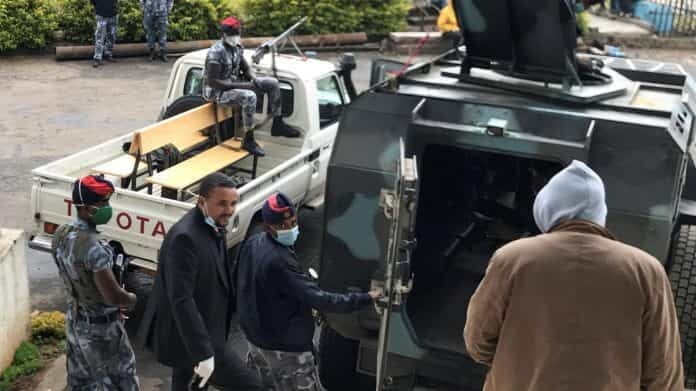Over the last year Ethiopia’s government has backtracked significantly on the progress it made to shed its repressive image when it comes to press freedom.
 Long renowned for its a poor record on media freedom, major inroads were believed to have been made two years ago after the then newly appointed prime minister Abiy Ahmed suddenly ordered the release of all imprisoned journalists and bloggers leaving none behind bars for the first time in 14 years. The move which garnered plenty of goodwill for Abiy’s government at the time was just one of several moves made to reform the country’s politics and economy including ending the two-decade conflict with neighbor Eritrea, for which was awarded the Nobel peace prize.
Long renowned for its a poor record on media freedom, major inroads were believed to have been made two years ago after the then newly appointed prime minister Abiy Ahmed suddenly ordered the release of all imprisoned journalists and bloggers leaving none behind bars for the first time in 14 years. The move which garnered plenty of goodwill for Abiy’s government at the time was just one of several moves made to reform the country’s politics and economy including ending the two-decade conflict with neighbor Eritrea, for which was awarded the Nobel peace prize.
But that optimism has largely waned, with journalists again being rounded up, while a number of independent radio and television stations have being shut down.
“We will no longer have patience for media outlets that seek to incite violence and pit peoples against each other, said” That was an excerpt from July 2 address by the Ethiopian capital Addis Ababa’s now former mayor Takele Uma. The Ethiopian government has blamed journalists and activists for a bout of horrific violence that left hundreds dead following the murder of songwriter Hachalu Hundessa.
Within days, the independent Oromia Media Network (OMN)’s Addis Ababa headquarters were ransacked by police and closed. Dozens of staff were arrested and charged with igniting communal violence. Among the staff rounded up was Guyo Wario, an OMN journalist who interviewed Hundessa weeks before his murder.
As the violence subsided, local press began investigating what had happened in conflict-ravaged areas. During the mayhem, Ethiopian government had shut down internet services, nearly halting the flow of information.
The risks of revealing the details of the widening conflict are extremely high, according to the managing editor of the local Yeroo newspaper, Geleta Tesfaye. “Some readers think we were pro-OLF [Oromo Liberation Front], others pro government,” Geleta told Quartz Africa. “One of our staff was previously arrested by police, another was attacked for taking photos of the aftermath of violence. The job is not easy.”
Another journalist, Belay Manaye published a piece [in Amharic] that highlighted failures by government security forces, was detained with a colleague in early August. Belay had been freelancing with a local human rights watchdog organization, Card Ethiopia.
“Belay said he’s confined with twelve other detainees in one small room,” says Card Ethiopia’s executive director, Befekadu Hailu. “He has sinus issues and feels sick due to being confined in a cell with a bad smell.”
Belay and three journalists from the private ASRAT TV station, had since been ordered free by a judge. But just after their release, the quartet were rearrested by plainclothes policemen in Addis Ababa on Tuesday. No explanation has been given.
A similar scenario played out when Kenyan freelance journalist Yassin Juma, among those detained during the July anti press crackdown, was also briefly let out of prison. He revealed in August to the US broadcaster VOA that not only was he rearrested as well, but also suffered a broken rib from police beatings in the process.
The impunity of security forces and their unwillingness to adhere to court orders is a trend that press freedom advocacy group Committee to Protect Journalists (CPJ), has noted with concern.
“The conduct with which authorities have carried out arrests of journalists and media workers, detained them without formal charges, and employed creative maneuvers to avoid complying with bail orders raises questions about the motives of the arrests,” explains Muthoki Mumo, the CPJ’s sub Saharan Africa representative.
The arbitrary nature of some of the court proceedings is perhaps best highlighted with the trial of Micah Chiri, an Ethiopian-American who was arrested in Addis Ababa on July 10. Micah worked as an IT specialist with the OMN and has been initially charged, alongside other OMN staff, with inciting violence, and plotting assassinations of high-profile government officials.
“I was just shocked when I learned of the nature of the charges,” explains his older brother Kitesso Chiri. “My brother left a job and a life in New York behind, to move to Ethiopia because he believed he could contribute to society there.”
Over the course of two months, with no evidence against him, Micah’s charges were reduced to what the court referred to as “telecom fraud.” Police came up with the charge after finding a WiFi booster in a search of Micah’s home. The device enhances internet reception and is widely available for around $30 at electronics stores.
“It’s a common gadget that anyone can obtain,” says Kitesso, who also works in IT. They’re just creating excuses to refuse bail and keep him in prison on politically motivated charges.”
Emailed queries to Ethiopian attorney general representative Zinabu Tulu by Quartz Africa regarding Micah Chiri’s trial and refusals by police to adhere to court orders, went unanswered.
